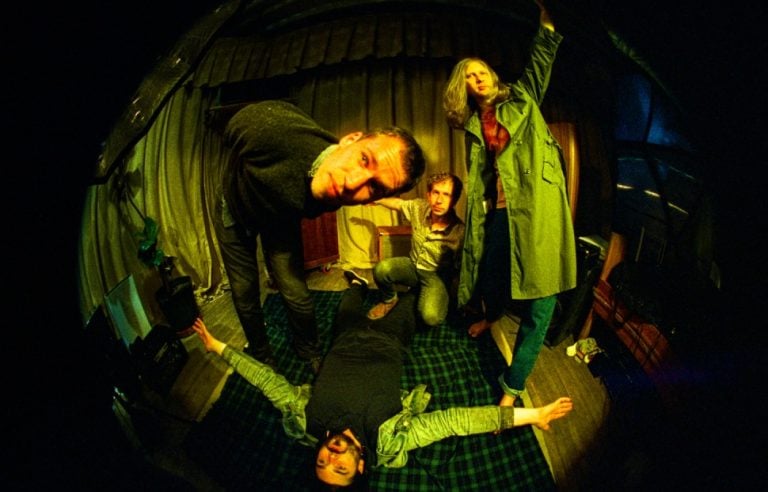“I’m making plans for the day all of this is through / Seeing my path there, hearing the song I’ll sing / And food that I’ll taste and all the drinks that I’ll consume / Return the smile of an unmasked friend.”
Those are the first lines uttered on Sympathy for Life, the new album from New York City’s Parquet Courts. To anyone hearing that song for the first time – paired as it is also with a music video that acts as an excitable ode to the delirious pleasures of partying in the city – they’d almost certainly believe it was a product of the COVID-19 pandemic.
That’s surprisingly not the case, according to Austin Brown, the band’s co-lead vocalist and guitarist. “We recorded most of it in 2019 and in the beginning of 2020 as well,” he tells me over Zoom. “We finished recording as a group in March of that year, and then it was lockdown so we had to make do. But we were mostly done by that time.”
The only song made after that time was ‘Marathon of Anger’, written about the Black Lives Matter protests. It’s about as pointed politically as the band has ever been. “That was something that was really impossible not to write about,” Austin insists.
“It was June and there was really nothing to think about besides the resurgence of Black Lives Matter. It was about considering my place in all of that. It would have been silly to even try to think or write about anything else. It (Black Lives Matter) was ever-present, especially here in New York.”

Love Music?
Get your daily dose of metal, rock, indie, pop, and everything else in between.
After an extensive tour for their previous album Wide Awake!, Austin and the rest of the band – Andrew Savage, Sean Yeaton, and Max Savage – found themselves growing tired of their usual rock scene. “I had become disillusioned with rock music and the indie world and all the things that were involved in that,” he recalls.
“I considered the indie world to just be a mirror of the pop world where we worshipped these minor faux-celebrities. Whether it was on social media or at their concerts or whatever. It felt that substance was quite lacking. Generally the concerts that we’d done at major festivals, we’d been surrounded by this culture that was uninspiring.”
A big revelation came as Austin started exploring dance music and culture more. “I found myself in this dance music world going to underground parties and raves. There was a major emphasis on the culture and the community that provides a safe space for people to express themselves.”
He discovered a community devoid of those “minor faux-celebrities” that he so disdained. “The music is at the centre of the dance world and it’s played by DJs. They’re playing other people’s records and everyone is just there to appreciate the music and not worship any one individual. Even if there are celebrities there, they’re treated as people equal to everyone else, which I found so refreshing.”
Before finding this new lifestyle and community, Austin tells me, he didn’t even feel like he wanted to make another Parquet Courts record. “I didn’t feel like we had anything else to offer or any other stories to tell,” he admits. That’s when the inspiration of dance music hit.
“And then all of a sudden it felt like something really important actually. It felt challenging and like there was something there. I was inspired by these new sounds. It was a great starting point and the way that we worked from there was really organic.”
After the relatively straightforward indie rock freneticism of ‘Walking At A Downtown Pace’, the album dissolves into languorous experimentations, danceable grooves expanded outward as far as they can go. It’s why when the time came to release the first single from Sympathy for Life, ‘Plant Life’, they decided to do it as vinyl-only, sending out copies to some of Austin’s favourite DJs.
“A few times I’d be listening to some live mixes, for internet radio or whatever, and I’d hear our test press and I was like, “Oh, it’s working, a DJ’s playing!” he laughs. “To me that meant the record was a success, that was the goal for me. Whatever happens after that doesn’t matter because the artistic success was to have it embraced by the DJ.”
When I say that you never imagine a musician like Bob Dylan listening much to his own music, Austin agrees. This dance-oriented record was all about giving Parquet Courts the opportunity to play their own music at a party. “One thing that we were conscious of when mixing the record was that if a DJ wanted to put on one of these tracks as a left-field selection, or blend it in with some other more traditional dance music, that the mix would be right to play in a club or party.”
Primal Scream have been cited as a major influence by the band for this album, specifically their seminal 1991 album Screamadelica: working alongside the late, great producer Andrew Weatherall, they crafted a dance-meets-rock record that brought rock ‘n’ roll inside the club. “I detect a Glaswegian accent there?” Austin asks me correctly in the midst of discussing them, one of the finest bands to ever emerge from the Scottish city. When I tell him that Screamadelica marked its 30th anniversary the week before we talk, he expresses surprise. “Oh really? Time moves funny these days!”
Screamadelica was a keystone record for Austin. “The Primal Scream connection was the way I was able to contextualise a person in a rock band trying to bring elements of rave and dance into their artistic process,” he says. “That was a big reference point. It was less about the actual music on the record and more about the process of it and the context in which they were working under.
That was a huge influence on our own process as we tried to achieve a similar result. We weren’t trying to get that record, we were trying to get our own record through a similar process.”
Where Primal Scream’s Bobby Gillespie was seduced by the intoxicating hedonism of “Madchester” at the beginning of the 1990s, Austin found a similar dance culture at esteemed New York venues like The Loft. It’s why he was overwhelmed when Colleen Cosmo Murphy, one of The Loft’s DJ’s, played their new record.
“That was a big compliment for me,” he says with a smile. “That was a huge deal for me as she’s someone who had inspired me on countless nights at that party. It’s a historical party, it’s been going on in New York for 50 years. She’s a huge part of what initially inspired me to make this record. And it was something that came organically, I didn’t know her before I sent her the record.”

There was another Scottish influence on the sound of Sympathy for Life in the form of producer Rodaidh McDonald (alongside John Parish). Before the interview, I looked into Rodaidh’s production history: Hot Chip, The XX, and Sampha are names not often associated with someone like Parquet Courts. Did it help having such a fresh non-rock perspective on the production side? “Absolutely,” Austin says.
“He was super encouraging of us to make space to experiment. He wasn’t quick to embrace a traditional rock song as it’s not his background or what excites him. And it’s not what’s exciting for me either, so it was great that he pushed us to seek out new territory and embrace the unconventional. “
This is far from the first time Parquet Courts have pushed themselves into different sonic territory though. There was the improvisational chaos of the 2015 EP Monastic Living, widely reviled by critics; there were curiosities spotted in amongst the more traditional garage rock and indie punk on other records like Human Performance too; their last album Wide Awake! was the first time they had worked with an outside producer in Danger Mouse and it showed in the increased grooves.
It’s Rodaidh’s influence, Austin insists, that really sets Sympathy for Life apart. “We’ve gotten into those spaces before on records but it was always a case of, “Ok, now we’re being weird, we need to get back to playing songs because songs are what make an album’.
And Rodaidh was really able to see the process clearly, to take these really weird areas that we get into and create a productive timeline. It allowed us to make the weird into a song rather than having the weird be an oddity or an easter egg on the album. He showed us we could base a whole song around these weird things that we were doing.”
Under Rodaidh’s guidance, improvisation played an important part in the recording sessions. He would record the entirety of their long jam sessions, sometimes lasting for 40 minutes, before refining them into shorter songs. “I think 7 out of the 11 songs on the album were created from improvisations,” Austin says.
“What Rodaidh was able to help us do was take these experimentations and push us to keep going and make real songs out of them. I wish we could have had him around back then to see where we could have gone!
Talk returns to Monastic Living. I ask Austin if he thinks – or wishes – that more rock bands conducted similar experiments of their own. “Absolutely. It was risky, it was commercially unviable. It was really liberating. Now I never feel like we need to make a certain type of record, I never even feel like we need to make a record.”
To really understand the suffocating constraints of being labelled as just a rock band, you only have to remember that Parquet Courts were dismissed as a mere Pavement ripoff when they first emerged in the 2010’s. “I had never even really listened to Pavement,” Austin laughs when I bring up that comparison.
He also feels that it’s now come full circle, with his own band now held up as the ‘in’ rock band to be cited. “I don’t really see the point in it because I can’t even define what we sound like honestly,” he says, barely hiding his frustration. “I mean, is ‘Sunbathing Animal’ a Parquet Courts song? Is ‘Uncast Shadow of a Southern Myth’ a Parquet Courts song? Is ‘Plant Life’ a Parquet Courts song? Is ‘Light Up Gold’ a Parquet Courts song?
Those are all vastly different songs, they could’ve been done by a variety of different people. I have such a hard time defining where we would land in that way. I’ve seen some really odd groups be compared to us that I thought didn’t make any sense.”
When I ask then what genre, if any, Parquet Courts belong to above others, his reply is unexpected. “We’ve been called all sorts of genres and micro-sub-genres but I’ve always considered us to be a psychedelic storytelling band. Psychedelic in nature, psychedelic in the way the Butthole Surfers are psychedelic, where they just don’t have any rules, they’re just doing what they feel without limits.
That’s what we do and I think that we’re storytellers. Maybe there isn’t a title for it yet.” Perhaps noticing my apprehension, he adds, “Maybe that’s quite a presumptive thing to say but you can quote me on that!”

Another key aspect of Screamadelica was the eager musical discovery of Bobby Gillespie and Andrew Weatherall: they consumed and sampled as wide a variety of sounds as possible, exploring everything from free jazz to acid house, 60’s psychedelia to 70’s funk. Talking to Austin, a similar anorak ambition is evident. When I ask about his knowledge of Australian music, he seems genuinely happy to go into detail about his favourite musicians from the country.
“In 2013, we toured with Total Control and UV Race and just made so many friends and connections through them. Those people are in so many other bands and they’re all stellar. There’s The Stevens – I don’t think any of those guys are in those bands so I have to give them a shout too!
I don’t know, Australia seems so fertile for these bands that pop up for like an album or two and then disappear (laughs). And of course you have the great Eddy Current Suppression Ring, I think for me they’re at the top of the pyramid in some ways.
He makes sure not to leave out electronic and dance music. “There’s Sleep D who put out a great record on Incienso Records. It’s run by a friend of mine, Anthony Naples, with Jenny Slattery. James Vinciguerra, the drummer for Total Control, did the cover art for it, which is how I recognised it originally. Roza Terenzi is doing amazing things as well. And of course Amyl and the Sniffers, our labelmates, are crushing it.”
The band returned to upstate New York to record Sympathy for Life, site of previous recording sessions for 2014’s Sunbathing Animal and 2016’s Human Performance. Working across two studios, a smaller production one and a larger recording one, they found a strong working groove as a foursome.
“Andrew would be doing vocals and I’d go to the small studio and pull up other sessions and just be editing,” Austin explains. “And then he’d call me back in and tell me they needed me for something like an overdub. I’d save the editing and come back to it later. There was a real hyperproductivity that was going on which felt really good.”
That’s when Austin notes something interesting. “I think the best instrument in our group is really the band. The way that we are able to collaborate collectively and communicate sonically is something that only a band that’s been together for 10 years can do. I’m proud of the work we’ve been able to get out of that time.”
A decade might not seem that long a time but in rock music terms it is; The Velvet Underground didn’t last anywhere near that long for one. The band celebrated their 10 year anniversary around this time last year, marking the occasion with a livestream. Going into their second decade together, what will be the story of Parquet Courts? More dance music?
“I think it remains to be seen honestly. I’m not super optimistic that there’s going to be a world in 10 years,” Austin says cheerfully while laughing. “If we’re around, I just hope that we continue to evolve and stay interested in what we’re doing because that’s the only reason that we still do it. The second it becomes boring or uninspiring, it’s just not a thing anymore for me.”
Sympathy for Life is released on Friday, October 22nd via Rough Trade Records/Remote Control Records.



































